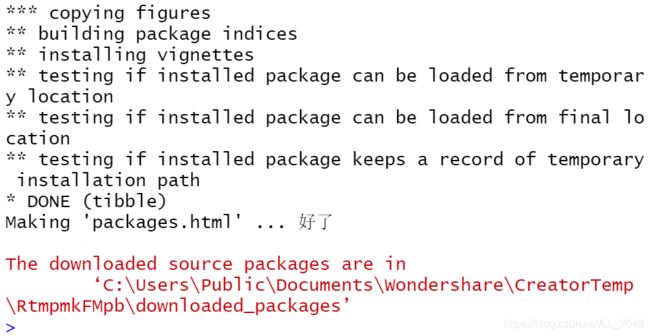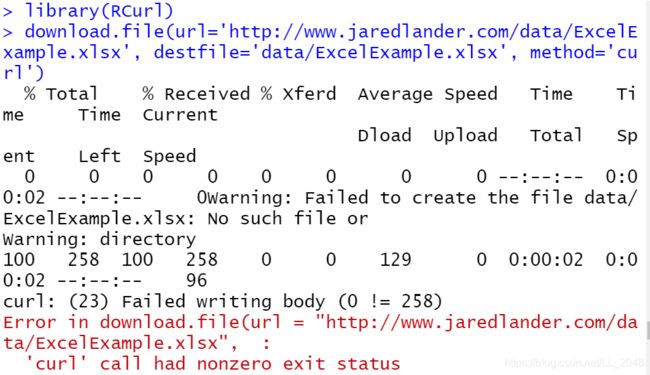R语言小白学习笔记3—R语言读取数据
R语言小白学习笔记3—R语言读取数据
- 笔记链接
- 想说的话
- 学习笔记3—R语言读取数据
-
- 3.1 读取CSV文件
-
- 3.1.1 read_delim函数
- 3.1.2 fread函数
- 3.2 读取Excel数据
- 3.3 读取数据库数据
- 3.4 读取其他统计工具数据
- 3.5 读取R语言二进制文件
- 3.6 读取R语言数据
- 3.7 读取网页数据
-
- 3.7.1读取HTML表格
- 3.7.2抽取网页数据
- 3.8 读取JOSN数据
笔记链接
学习笔记1—R语言基础.
学习笔记2—高级数据结构.
想说的话
我觉得R语言读取数据还是比较重要的,这章真的,遇到了特别多的问题,然后一个问题一个问题去解决,所以花了两天才学完。笔记中我也给出了我的解决思路和方法,每一个例子我都敲了一遍,加深印象。
学习笔记3—R语言读取数据
3.1 读取CSV文件
读取CSV文件最好的方法是使用read.table函数,其返回结果为data.frame
read.table函数第一个参数为文件所在路径,本地或网页
第二个参数header表示数据的第一行,即列名
第三个参数sep表示数据的分隔符
例:
> theUrl <- "http://www.jaredlander.com/data/TomatoFirst.csv"
> tomato <- read.table(file=theUrl, header=TRUE, sep=",")
> head(tomato)
Round Tomato Price Source Sweet Acid
1 1 Simpson SM 3.99 Whole Foods 2.8 2.8
2 1 Tuttorosso (blue) 2.99 Pioneer 3.3 2.8
3 1 Tuttorosso (green) 0.99 Pioneer 2.8 2.6
4 1 La Fede SM DOP 3.99 Shop Rite 2.6 2.8
5 2 Cento SM DOP 5.49 D Agostino 3.3 3.1
6 2 Cento Organic 4.99 D Agostino 3.2 2.9
Color Texture Overall Avg.of.Totals Total.of.Avg
1 3.7 3.4 3.4 16.1 16.1
2 3.4 3.0 2.9 15.3 15.3
3 3.3 2.8 2.9 14.3 14.3
4 3.0 2.3 2.8 13.4 13.4
5 2.9 2.8 3.1 14.4 15.2
6 2.9 3.1 2.9 15.5 15.1
大文件使用read.table函数读取到内存比较慢,读取大CSV文件两个主流函数:read_delim和fread,因为两者都不把字符数据自动转换成factor。
3.1.1 read_delim函数
readr包提供读取文本文件的一系列函数。最常用的是read_delim函数。
其第一个参数为读取的文件路径或者URL。col_names默认为TRUE,指定文件的第一行为列名。
其返回为tibble数据类型,是data.frame的扩展。
例:
> theUrl <- "http://www.jaredlander.com/data/TomatoFirst.csv"
> tomato2 <- read_delim(file=theUrl, delim=',')
-- Column specification ---------------------------------
cols(
Round = col_double(),
Tomato = col_character(),
Price = col_double(),
Source = col_character(),
Sweet = col_double(),
Acid = col_double(),
Color = col_double(),
Texture = col_double(),
Overall = col_double(),
`Avg of Totals` = col_double(),
`Total of Avg` = col_double()
)
> tomato2
# A tibble: 16 x 11
Round Tomato Price Source Sweet Acid Color Texture
<dbl> <chr> <dbl> <chr> <dbl> <dbl> <dbl> <dbl>
1 1 Simps~ 3.99 Whole~ 2.8 2.8 3.7 3.4
2 1 Tutto~ 2.99 Pione~ 3.3 2.8 3.4 3
3 1 Tutto~ 0.99 Pione~ 2.8 2.6 3.3 2.8
4 1 La Fe~ 3.99 Shop ~ 2.6 2.8 3 2.3
5 2 Cento~ 5.49 D Ago~ 3.3 3.1 2.9 2.8
6 2 Cento~ 4.99 D Ago~ 3.2 2.9 2.9 3.1
7 2 La Va~ 3.99 Shop ~ 2.6 2.8 3.6 3.4
8 2 La Va~ 3.99 Faicos 2.1 2.7 3.1 2.4
9 3 Stani~ 4.53 Resta~ 3.4 3.3 4.1 3.2
10 3 Ciao NA Other 2.6 2.9 3.4 3.3
11 3 Scott~ 0 Home ~ 1.6 2.9 3.1 2.4
12 3 Di Ca~ 12.8 Eataly 1.7 3.6 3.8 2.3
13 4 Trade~ 1.49 Trade~ 3.4 3.3 4 3.6
14 4 365 W~ 1.49 Whole~ 2.8 2.7 3.4 3.1
15 4 Muir ~ 3.19 Whole~ 2.9 2.8 2.7 3.2
16 4 Biona~ 3.39 Whole~ 2.4 3.3 3.4 3.2
# ... with 3 more variables: Overall , `Avg of
# Totals` , `Total of Avg`
在这里安装readr包的时候出现了一些问题:
第一个问题:
WARNING: Rtools is required to build R packages but is not currently installed. Please download and install the appropriate version of Rtools before proceeding。
解决:问度娘->需要下载Rtools->下载
然后是漫长的等待时间,这里我下载的是rtools40,为了节省大家时间,安装包见:
https://download.csdn.net/download/LL_2048/14984549.
第二个问题:
downloaded length != reported length
导致需要下载的好多zip文件都不能用。
解决:问度娘->是因为下载速度太慢,所以出现了长度不相同的问题->修改设定CRAN镜像
3.1.2 fread函数
另一个读取大量数据的函数是data.table包的fread函数。
第一个参数是读取的文件路径
header参数表示第一行是列名
sep指定分隔符
其返回结果为data.table对象,是data.frame的扩展和优化
例:
> library(data.table)
> tomato3 <- fread(input=theUrl, sep=',', header=TRUE)
试开URL’http://www.jaredlander.com/data/TomatoFirst.csv'
Content type 'text/csv' length 1107 bytes
downloaded 1107 bytes
> head(tomato3)
Round Tomato Price Source Sweet Acid
1: 1 Simpson SM 3.99 Whole Foods 2.8 2.8
2: 1 Tuttorosso (blue) 2.99 Pioneer 3.3 2.8
3: 1 Tuttorosso (green) 0.99 Pioneer 2.8 2.6
4: 1 La Fede SM DOP 3.99 Shop Rite 2.6 2.8
5: 2 Cento SM DOP 5.49 D Agostino 3.3 3.1
6: 2 Cento Organic 4.99 D Agostino 3.2 2.9
Color Texture Overall Avg of Totals Total of Avg
1: 3.7 3.4 3.4 16.1 16.1
2: 3.4 3.0 2.9 15.3 15.3
3: 3.3 2.8 2.9 14.3 14.3
4: 3.0 2.3 2.8 13.4 13.4
5: 2.9 2.8 3.1 14.4 15.2
6: 2.9 3.1 2.9 15.5 15.1
3.2 读取Excel数据
使用readxl包中的read_excel函数,但其需要先下载好文件。
原书中的代码:
> download.file(url='http://www.jaredlander.com/data/ExcelExample.xlsx', destfile='data/ExcelExample.xlsx', method='curl')
> library(readxl)
> excel_sheets('data/ExcelExample.xlsx')
但我遇到了好多问题:
首先是用download.file时出现了一些问题:
一直出现这个错误:
Error in download.file(url = “http://www.jaredlander.com/data/ExcelExample.xlsx”, :
‘curl’ call had nonzero exit status
百度后发现解决方案都在说linux,所以难道是因为windows中没有curl方法吗?于是:
>install.packages("RCurl")
走起!
于是我想看下download.file的帮助文件
> help("download.file")
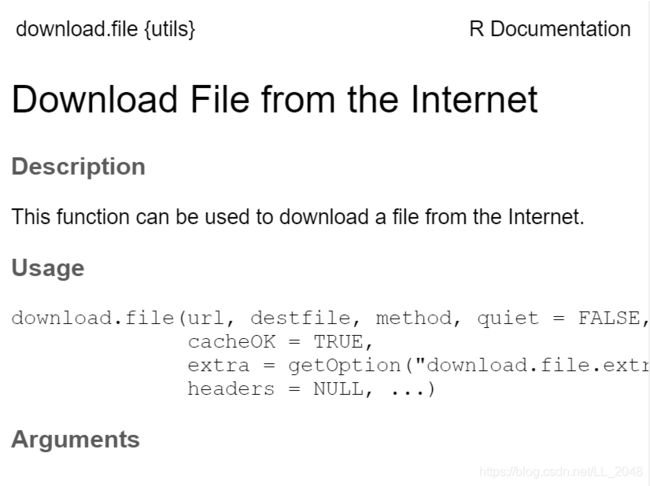
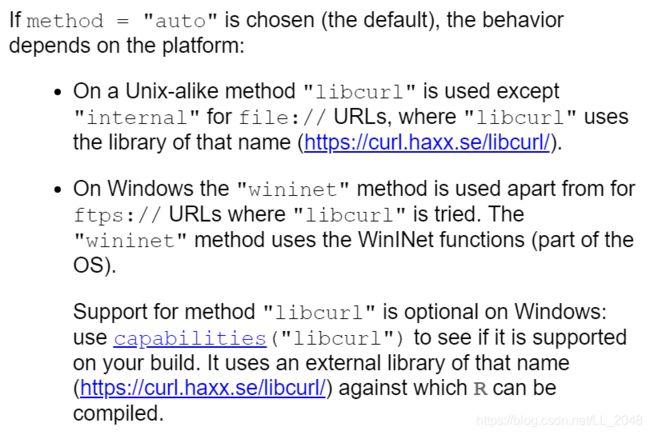
这里提到了method里的其他方法,于是我试了一下auto,发现真的解决了上边那个问题,但新的问题:
>download.file(url='http://www.jaredlander.com/data/ExcelExample.xlsx', destfile='data/ExcelExample.xlsx', method='auto')
Error in download.file(url = "http://www.jaredlander.com/data/ExcelExample.xlsx", :
无法打开目的文件'data/ExcelExample.xlsx',原因是'No such file or directory'
我想了想,这里可能是没有建立data文件夹的问题,所以我无奈地把data删了(当时想法比较单纯,我只想把他下载下来)
> download.file(url='http://www.jaredlander.com/data/ExcelExample.xlsx', destfile='ExcelExample.xlsx', method='auto')
试开URL’http://www.jaredlander.com/data/ExcelExample.xlsx'
Content type 'application/vnd.openxmlformats' length 2045364 bytes (2.0 MB)
downloaded 2.0 MB
这里终于下载好了
然而
> excel_sheets('ExcelExample.xlsx')
错误: Evaluation error: error -103 with zipfile in unzGetCurrentFileInfo
我直接反手就是…… ……复制粘贴->百度
可惜百度上也没有解决方法,于是我检查了一下下载的excel文件:
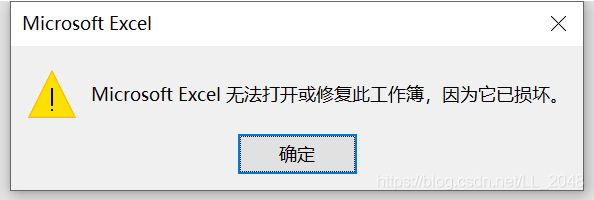
阿西吧,为啥打不开嘞?
我猜测可能是下载的时候出现损坏,或者原来这个文件就是坏的。
于是无奈复制粘贴了网址直接百度下载,终于下载好了。
> excel_sheets('E:/B/R/ExcelExample.xlsx')
[1] "Tomato" "Wine" "ACS"
太感动了!继续!
这里用的read_excel函数进行读取,返回的是tibble类型的数据。
> tomatoXL <- read_excel('E:/B/R/ExcelExample.xlsx')
> tomatoXL
# A tibble: 16 x 11
Round Tomato Price Source Sweet Acid Color Texture
<dbl> <chr> <dbl> <chr> <dbl> <dbl> <dbl> <dbl>
1 1 Simps~ 3.99 Whole~ 2.8 2.8 3.7 3.4
2 1 Tutto~ 2.99 Pione~ 3.3 2.8 3.4 3
3 1 Tutto~ 0.99 Pione~ 2.8 2.6 3.3 2.8
4 1 La Fe~ 3.99 Shop ~ 2.6 2.8 3 2.3
5 2 Cento~ 5.49 D Ago~ 3.3 3.1 2.9 2.8
6 2 Cento~ 4.99 D Ago~ 3.2 2.9 2.9 3.1
7 2 La Va~ 3.99 Shop ~ 2.6 2.8 3.6 3.4
8 2 La Va~ 3.99 Faicos 2.1 2.7 3.1 2.4
9 3 Stani~ 4.53 Resta~ 3.4 3.3 4.1 3.2
10 3 Ciao NA Other 2.6 2.9 3.4 3.3
11 3 Scott~ 0 Home ~ 1.6 2.9 3.1 2.4
12 3 Di Ca~ 12.8 Eataly 1.7 3.6 3.8 2.3
13 4 Trade~ 1.49 Trade~ 3.4 3.3 4 3.6
14 4 365 W~ 1.49 Whole~ 2.8 2.7 3.4 3.1
15 4 Muir ~ 3.19 Whole~ 2.9 2.8 2.7 3.2
16 4 Biona~ 3.39 Whole~ 2.4 3.3 3.4 3.2
# ... with 3 more variables: Overall , `Avg of
# Totals` , `Total of Avg`
可以通过提供表的位置索引(数字)或者表的名称(字符)来读取Excel文件的指定表:
> wineXL1 <- read_excel('E:/B/R/ExcelExample.xlsx', sheet=2)
> head(wineXL1)
# A tibble: 6 x 14
Cultivar Alcohol `Malic acid` Ash `Alcalinity of ~
<dbl> <dbl> <dbl> <dbl> <dbl>
1 1 14.2 1.71 2.43 15.6
2 1 13.2 1.78 2.14 11.2
3 1 13.2 2.36 2.67 18.6
4 1 14.4 1.95 2.5 16.8
5 1 13.2 2.59 2.87 21
6 1 14.2 1.76 2.45 15.2
# ... with 9 more variables: Magnesium , `Total
# phenols` , Flavanoids , `Nonflavanoid
# phenols` , Proanthocyanins , `Color
# intensity` , Hue , `OD280/OD315 of diluted
# wines` , Proline
3.3 读取数据库数据
大部分数据库都可以通过各种驱动访问(通常是ODBC连接)。最流行的开源数据库有R语言实验包,如:RPostgreSQL和RMySQL。
这里用简单的SQLite来演示读取数据库:
首先用download.file函数下载数据库文件:
> download.file("http://www.jaredlander.com/data/diamonds.db",destfile="E:/B/R/diamonds.db", mode='wb')
竟然一次就成功了,有点兴奋,继续:
安装加载RSQLite包:
> install.packages("RSQLite")
> library(RSQLite)
首先用dbDriver函数指定驱动连接数据库,该函数主要参数为驱动的类型,如"SQLite"或者"ODBC"
> drv <- dbDriver('SQLite')
> class(drv)
[1] "SQLiteDriver"
attr(,"package")
[1] "RSQLite"
然后用dbConnect函数建立数据库连接,第一个参数是驱动,第二个常用参数是DSN连接字符串或路径。
> con <- dbConnect(drv, 'E:/B/R/diamonds.db')
> class(con)
[1] "SQLiteConnection"
attr(,"package")
[1] "RSQLite"
现在就已经连上数据库了,用DBI包的函数可以查看更多:
> dbListTables(con)
[1] "DiamondColors" "diamonds" "sqlite_stat1"
> dbListFields(con, name='diamonds')
[1] "carat" "cut" "color" "clarity" "depth"
[6] "table" "price" "x" "y" "z"
使用dbGetQuery函数准备执行查询数据库,返回data.frame数据类型:
> diamondsTable <- dbGetQuery(con, "SELECT * FROM diamonds", stringAsFactors=FALSE)
> head(diamondsTable)
carat cut color clarity depth table price x
1 0.23 Ideal E SI2 61.5 55 326 3.95
2 0.21 Premium E SI1 59.8 61 326 3.89
3 0.23 Good E VS1 56.9 65 327 4.05
4 0.29 Premium I VS2 62.4 58 334 4.20
5 0.31 Good J SI2 63.3 58 335 4.34
6 0.24 Very Good J VVS2 62.8 57 336 3.94
y z
1 3.98 2.43
2 3.84 2.31
3 4.07 2.31
4 4.23 2.63
5 4.35 2.75
6 3.96 2.48
3.4 读取其他统计工具数据
foreign包提供了一些用于读取其他格式的数据的命令
部分常用统计工具数据导入的函数:
| 函数 | 读取格式 |
|---|---|
| read.spss | SPSS |
| read.dta | Stata |
| read.ssd | SAS |
| read.octave | Octave |
| read.mtp | Minitab |
| read.systat | Systat |
这些函数的返回是data.frame,但并不是每次都会成功,虽然read.ssd可以读入SAS数据,但它需要有效的SAS许可证。
Hadley Wickham重写了新包haven,优化了速度和易用性,返回结果为tibble类型,常用函数:
| 函数 | 读取格式 |
|---|---|
| read_spss | SPSS |
| read_sas | Stata(书上是这样写的,但我觉得这里是SAS) |
| read_stata | Systat(同上,我觉得这里是Stata) |
3.5 读取R语言二进制文件
与其他程序员一起工作时,传递数据或R对象最好方法是用Rdata文件,可储存多个对象,并在三大系统间传递
例:创建一些对象存储在RData文件中,删除后,再加载
> n <- 20
> r <- 1:10
> w <- data.frame(n, r)
> n
[1] 20
> w
n r
1 20 1
2 20 2
3 20 3
4 20 4
5 20 5
6 20 6
7 20 7
8 20 8
9 20 9
10 20 10
> save(n, r, w, file="E:/B/R/multiple.rdata")
> rm(n, r, w)
> n
错误: 找不到对象'n'
> load("E:/B/R/multiple.rdata")
> n
[1] 20
这些对象存放到工作环境时和存储到RData中名字相同,所以不用把load函数结果分配给对象。
函数saveRDS将对象保存到一个二进制RDS文件中,此时保存的对象没有名字,所以加载到工作环境后需要分配对象:
> smallVector <- c(1, 5, 4)
> smallVector
[1] 1 5 4
> saveRDS(smallVector, file='thisObject.rds')
> thatVect <- readRDS('thisObject.rds')
> thatVect
[1] 1 5 4
> identical(smallVector, thatVect)
[1] TRUE
3.6 读取R语言数据
R和一些软件包自带数据
只需要输入data( )即可
例:
> data(diamonds, package = 'ggplot2')
> head(diamonds)
# A tibble: 6 x 10
carat cut color clarity depth table price x y
<dbl> <ord> <ord> <ord> <dbl> <dbl> <int> <dbl> <dbl>
1 0.23 Ideal E SI2 61.5 55 326 3.95 3.98
2 0.21 Prem~ E SI1 59.8 61 326 3.89 3.84
3 0.23 Good E VS1 56.9 65 327 4.05 4.07
4 0.290 Prem~ I VS2 62.4 58 334 4.2 4.23
5 0.31 Good J SI2 63.3 58 335 4.34 4.35
6 0.24 Very~ J VVS2 62.8 57 336 3.94 3.96
# ... with 1 more variable: z 3.7 读取网页数据
3.7.1读取HTML表格
如果数据存储在HTML表格,可以使用XML包中的readHTMLTable函数抽取数据。
例:
> theURL <- "https://www.jaredlander.com/2012/02/another-kind-of-super-bowl-pool/"
> bowlPool <- readHTMLTable(theURL, which=1, header=FALSE, stringsAsFactors=FALSE)
结果出现了错误:
错误: failed to load external entity “http://www.jaredlander.com/2012/02/another-kind-of-super-bowl-pool”
可能是网站变了的缘故?
于是我用浏览器进入这个网址,发现前边是https,然后修改:
> theURL <- "https://www.jaredlander.com/2012/02/another-kind-of-super-bowl-pool/"
> bowlPool <- readHTMLTable(theURL, which=1, header=FALSE, stringsAsFactors=FALSE)
Error in (function (classes, fdef, mtable) :
unable to find an inherited method for function ‘readHTMLTable’ for signature ‘"NULL"’
此外: Warning message:
XML content does not seem to be XML: ''
出错!
百度发现好像不能抓取https的网页,额~好吧,但现在网页好像都是https,可能学到后边会有新的方法吧,go on!
3.7.2抽取网页数据
网页数据一般在table、div、span或者其他html元素中。本例以纽约Ribalta比萨网站的菜单和门店信息为例,地址电话存储在ordered list中,列标记在span元素中,物品和价格在table中。
这里使用rvest包进行数据抽取。
网页文件用read_html函数读取:
> library(rvest)
> ribalta <- read_html('http://www.jaredlander.com/data/ribalta.html')
> class(ribalta)
[1] "xml_document" "xml_node"
> ribalta
{html_document}
<html xmlns="http://www.w3.org/1999/xhtml">
[1] <head>\n<meta http-equiv="Content-Type" content="t ...
[2] <body>\r\n<ul>\n<li class="address">\r\n <span ...
通过查看HTML,可以看到地址存储在span中,首先用html_nodes函数选择ul元素里的所有span元素:
> ribalta %>% html_nodes('ul') %>% html_nodes('span')
{xml_nodeset (6)}
[1] <span class="street">48 E 12th St</span>
[2] <span class="city">New York</span>
[3] <span class="zip">10003</span>
[4] <span>\r\n \t<span id="latitude" value="40.7333 ...
[5] <span id="latitude" value="40.733384"></span>
[6] <span id="longitude" value="-73.9915618"></span>
管道符见笔记1.8管道
这将返回ul元素的所有span节点的列表,接下来使用html_nodes函数搜索带有’.street’类的任意元素:
> ribalta %>% html_nodes('.street')
{xml_nodeset (1)}
[1] <span class="street">48 E 12th St</span>
为了实现数据抽取,可以调用html_text函数抽取span元素内的文本:
> ribalta %>% html_nodes('.street') %>% html_text()
[1] "48 E 12th St"
当待抽取的信息数据存储在html元素的属性中,则需要使用html_attr函数:
例,抽取ID’longitude’的span元素属性:
> ribalta %>% html_nodes('#longitude') %>% html_attr('value')
[1] "-73.9915618"
本例许多信息存储在’food-items’类的table中,所以通过html_nodes函数搜索’food-items’类的table,因为有多个表格,我们需要的为第六个,这里用magrittr包里的extract2函数对表格选取。
使用html_table函数抽取的数据最终存为data.frame数据类型:
> ribalta %>% html_nodes('table.food-items') %>% magrittr::extract2(5) %>% html_table()
X1
1 Marinara Pizza Rosse
2 Doc Pizza Rosse
3 Vegetariana Pizza Rosse
4 Brigante Pizza Rosse
5 Calzone Pizza Rosse
6 Americana Pizza Rosse
X2
1 basil, garlic and oregano.
2 buffalo mozzarella and basil.
3 mozzarella cheese, basil and baked vegetables.
4 mozzarella cheese, salami and spicy oil.
5 ricotta, mozzarella cheese, prosciutto cotto and black pepper.
6 mozzarella cheese, wurstel and fries.
X3
1 9
2 15
3 15
4 15
5 16
6 16
3.8 读取JOSN数据
对于API和文档数据库特别常用的数据格式是JSON,它是基于纯文本的可嵌套的数据格式。
读取JSON数据两个主要的包:rjson和rjsonlite
fromJSON函数读取JSON文件进入R语言,解析JSON文本,默认其将数据简化为data.frame数据类型:
> library(jsonlite)
> pizza <- fromJSON('http://www.jaredlander.com/data/PizzaFavorites.json')
> pizza
Name
1 Di Fara Pizza
2 Fiore's Pizza
3 Juliana's
4 Keste Pizza & Vino
5 L & B Spumoni Gardens
6 New York Pizza Suprema
7 Paulie Gee's
8 Ribalta
9 Totonno's
Details
1 1424 Avenue J, Brooklyn, NY, 11230
2 165 Bleecker St, New York, NY, 10012
3 19 Old Fulton St, Brooklyn, NY, 11201
4 271 Bleecker St, New York, NY, 10014
5 2725 86th St, Brooklyn, NY, 11223
6 413 8th Ave, New York, NY, 10001
7 60 Greenpoint Ave, Brooklyn, NY, 11222
8 48 E 12th St, New York, NY, 10003
9 1524 Neptune Ave, Brooklyn, NY, 11224
